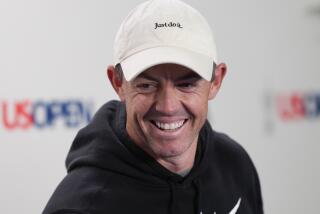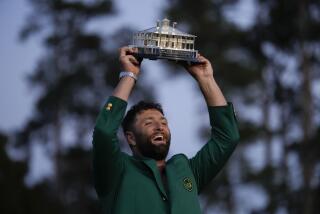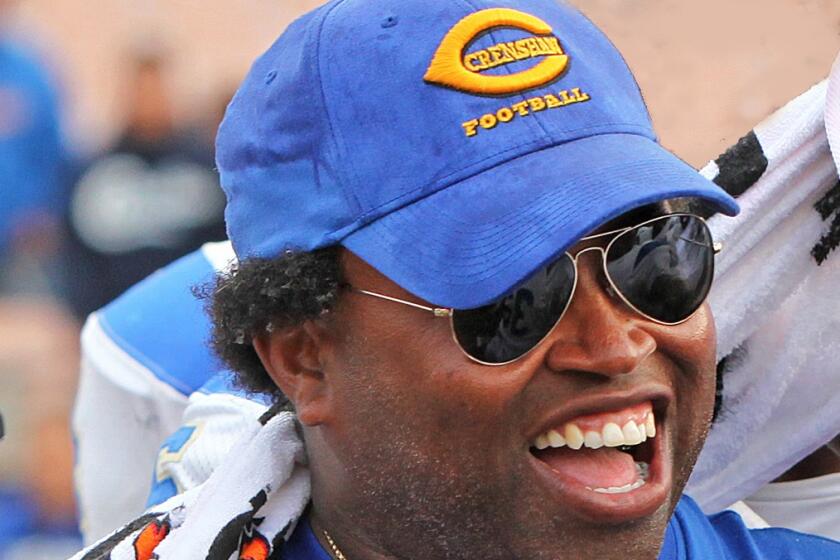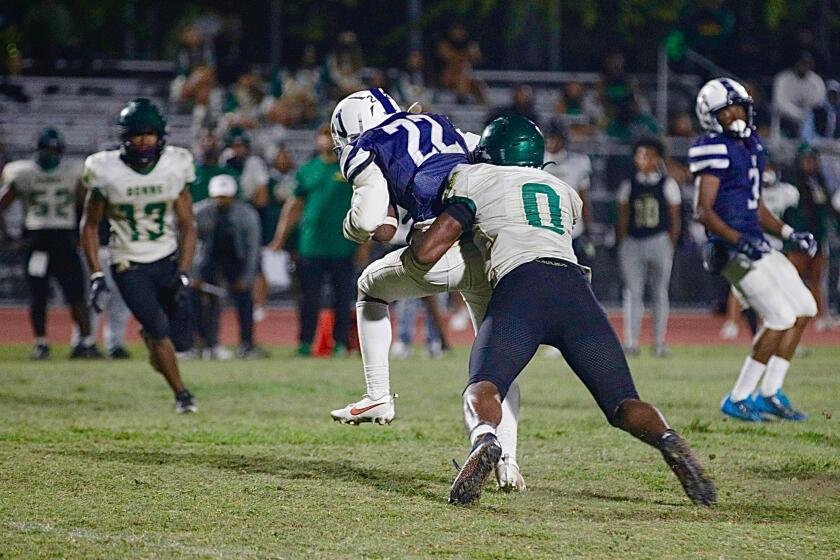Golfâs Foreign Legion Accented at Augusta
AUGUSTA, Ga. â Just before a rainstorm struck and sent some of the worldâs greatest golfers scrambling for shelter, Gary Player, the South African, was chatting about Severiano Ballesteros, the Spaniard, and about Bernhard Langer, the West German, and about Sandy Lyle, the Scot, all of whom have convincingly proved that to be among the masters at the Masters, it is not necessary to have been born in the USA.
It used to be at this great American sporting event that the one truly great foreign-born player was Player, the man who has won the Masters three times. For two decades, he, Arnold Palmer and Jack Nicklaus were the kings of clubs.
But along came Ballesteros, who won here in 1980 and 1983 and tied for second place a year ago. Right behind him came Langer, who modeled the green jacket last April. Now there is Lyle, who won the 1985 British Open and covered expenses for this weekâs event by earning 90,000 Yankee dollars at the Greater Greensboro tour stop Sunday in North Carolina.
Any of them could take the Masters, as could Australiaâs David Graham, who already has won two majors, or countryman Greg Norman, winner of the 1984 Canadian Open, or Japanâs Isao Aoki, whose 128-yard, tournament-winning eagle on the final hole of the 1983 Hawaiian Open still causes buzzes. Even Tze-Chung Chen of Taiwan, the man who chipped and dipped away the 1985 U.S. Open, is among the 15 guys from abroad who will tee off Thursday.
Amazing the way the âforeignersâ have been taking over the golf world, ainât it?
âYouâre amazed. Iâm not amazed,â Player said Tuesday. âIâve traveled around the world and Iâve seen it coming for a long time. So, it doesnât surprise me at all. And there are a lot of good guys that are still capable of coming over.
âAnd,â Player continued, emphatically, âI think as long as America--and I might be wrong--as long as America goes for this top-125, all-exempt system it has now, your golf is not going to improve at the rate that it should. Because now youâve got guys who win X amount of money and say, âOh, now Iâm in the top 125!â
âWhen Palmer and Nicklaus and I played, there was only one thought on our minds: You gotta win the tournament. Now thereâs a complacency, and I think itâs a bad thing. The system is breeding complacency on the tour. And the one thing that made this country so great is competition!â
The top 125 money winners on each yearâs tour automatically are exempt from qualifying for the next yearâs tournaments. Player, 50, believes that too many of todayâs young players are satisfied with a decent payday and do not have the burning desire to win.
âDoes it make sense?â Player asked. âDoes what Iâm saying make sense?â
It does to Ballesteros.
He likes money, sure. And the American tour offers big money. But he has other obligations to consider. His family still lives in Spain, in Pedrena, on the Bay of Santander. His closest friends live nearby. And Ballesteros is to tournaments in Europe what Palmer and Nicklaus were to tournaments in this country, a drawing card that can make or break interest in the event.
But Ballesteros disobeyed a new rule instituted two years ago by PGA Commissioner Deane Beman that forces foreign players to enter at least 15 U.S. tournaments a year.
Ballesteros entered nine in 1985 and was suspended from the tour by Beman. He can play only in the three majors here--the Masters, U.S. Open and PGA--and in events in which he is defending champion, such as New Orleans.
So, in the United States, at least, Ballesteros is more tourist than touring pro. In a typical year, he will enter 8 tournaments here, 12 in Europe and 5 somewhere else, usually Australia. A recent Internal Revenue Service edict exacting harsh taxes from visitors working 120 days or more in the United States has made it even more difficult for foreigners to play here more often.
Since Ballesteros does not hang around for long, there are not many opportunities to talk with him about his play, other than in an interview tent after a particularly good round. In his last U.S. event, at New Orleans March 20-23, there was not even that chance. He missed the cut after two rounds.
After a practice round Tuesday, Ballesteros put his head down and made a beeline for the Augusta National clubhouse, but was intercepted, after what a comedian might refer to as a Seve chase, near the swinging saloon-style doors of the âPresent in Champions Room,â where only former Masters champions are permitted to dress.
A quick-change artist if ever there was one, Ballesteros left Louisiana on March 24, flew home, finished fourth in the Spanish PGA, then flew back here for the Masters. He will spend his 29th birthday here today, practicing.
âI like this country. The best players are here and the best facilities are here,â Ballesteros said. âSure, I would like to play here more. But I have to support the European tour. And I want to enjoy my friends and my family.
âI always say I am prepared to come and play anytime I can, but never more than eight or nine tournaments. If I play 15 in America, I have to play 15 in Europe and that is already 30, plus Japan, Australia and South Africa, that is 35. That is not possible. That is too much.â
The Masters, he said, is an extremely important tournament to him, but not the most important. The British Open means more.
When he won here in 1980, at 23, Ballesteros became the youngest Masters champion. But he was already playing like an old pro. At no time in the tournament was he anything lower than tied for the lead. After two rounds, he was nine under par. Midway through the final round, he was 16 under. He won by four strokes.
In 1983, when rain extended the tournament to a Monday conclusion, Ballesteros won again by four shots. And, paired with Langer, he fought to the finish a year ago before losing by two. He knows this course the way a club member knows it.
âThe Masters means a lot wherever it happens,â Ballesteros said, meaning whenever but getting his point across. âIt means a lot to any player. It would be very nice to win it again.
âMy career since 1979, when I won my first major, has been very consistent. No slumps. Some year was better than another, but no big difference from one year to another.â
No year-long period where the game fell apart, or six-month slump.
âNo,â Ballesteros said. âNever happen.â
The U.S. Open and PGA are the only tournaments in this country that Ballesteros can enter after this one. At New Orleans he was critical of the commissionerâs suspension, but Tuesday he chose to stick to the subject of golf.
âLet me be honest with you,â Ballesteros said. âI come here to play, and to enjoy the facilities and the hospitality, and to win. I do not come to say if Deane Beman is right or wrong. I just come here to play good, and enjoy, and to have a good fight, and to win. That is all my thoughts this week.â
Win again, he might. Player said of Ballesteros: âAmerica has seen a part of his talent. A part. They havenât seen his full potential.
âItâs his desire, his choice to play all over the world, but maybe thatâs not bad. Look at my career. I traveled more than any athlete in history, 6 million miles or more, and got an education I never could have gotten in college.
âIâve seen the world and have come to respect the different points of view and customs. They canât even do that at the United Nations.â
Ballesteros was asked if he will still be out there on the courses of the world, trying to win tournaments, when he reaches Playerâs age.
âI am going to see if I can reach 30 first,â he said, and between the swinging doors he slipped.
More to Read
Go beyond the scoreboard
Get the latest on L.A.'s teams in the daily Sports Report newsletter.
You may occasionally receive promotional content from the Los Angeles Times.










